AWM41 1072 - [Official History, 1914-18 War: Records of Arthur G Butler:] Interviews containing accounts of Nursing experiences in the AANS [Australian Army Nursing Service]. These nurses were interviewed by Matron Kellett - Part 12
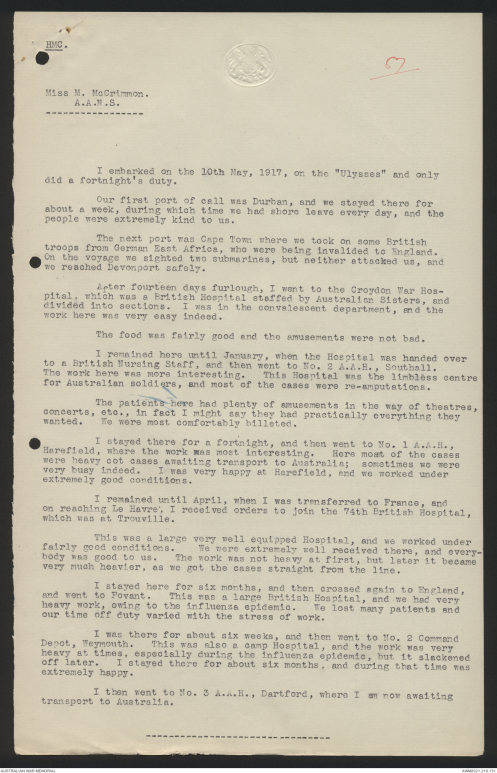
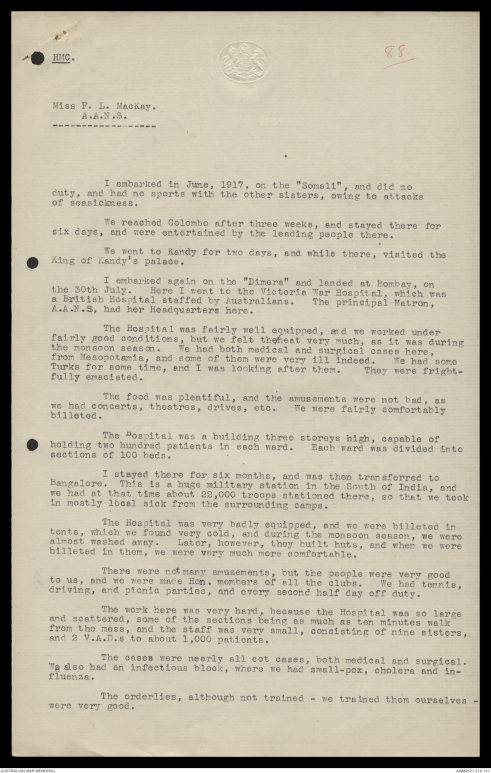
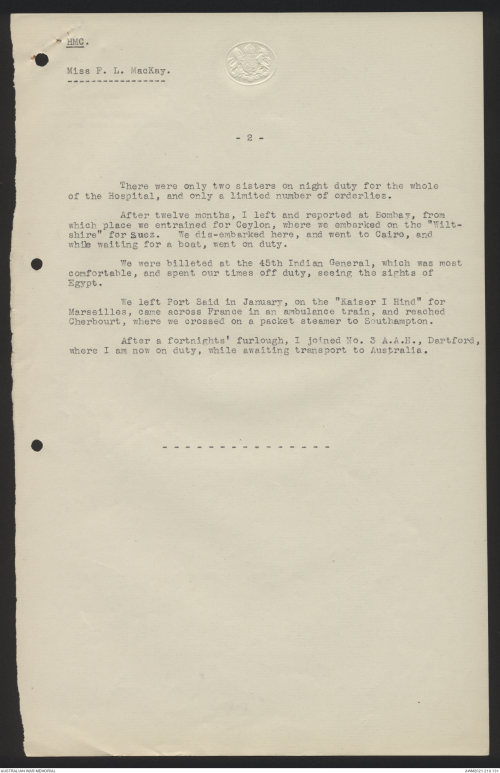
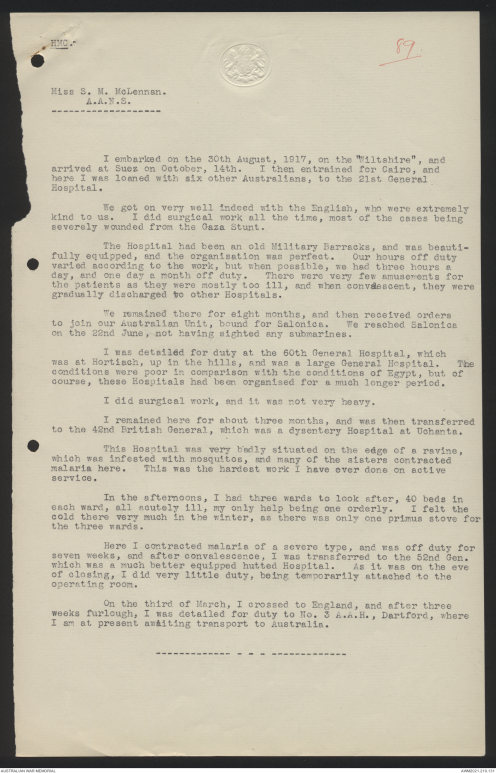
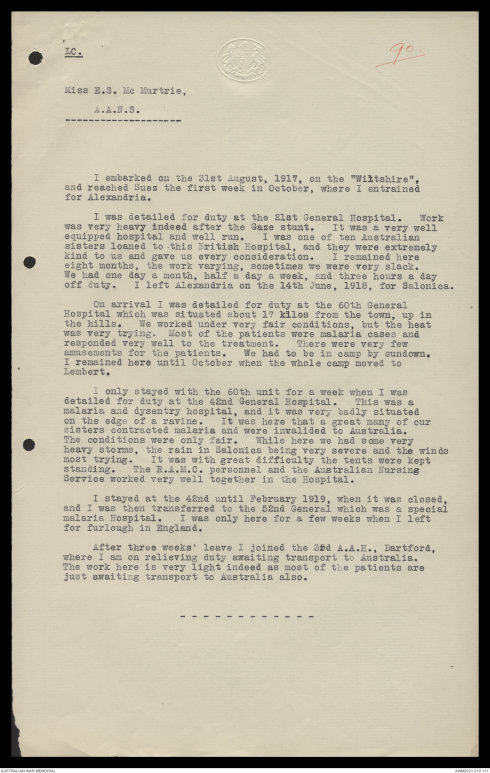
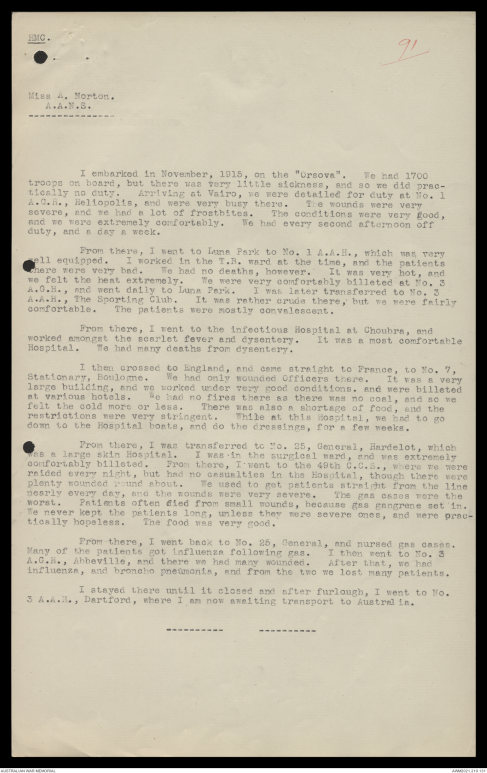
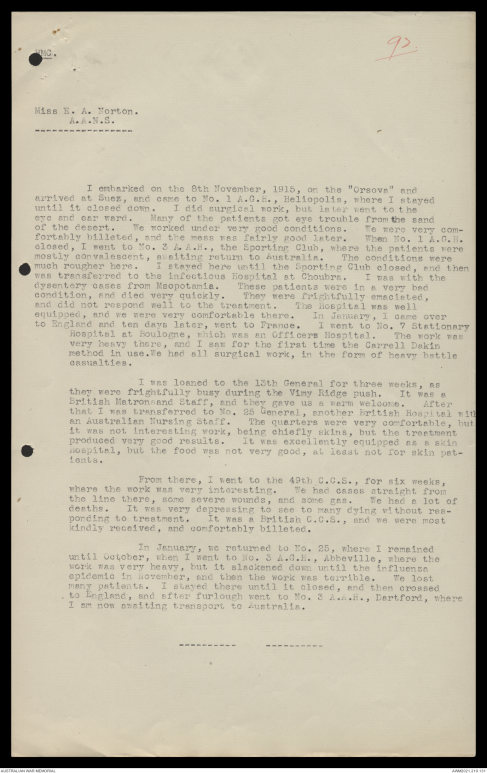
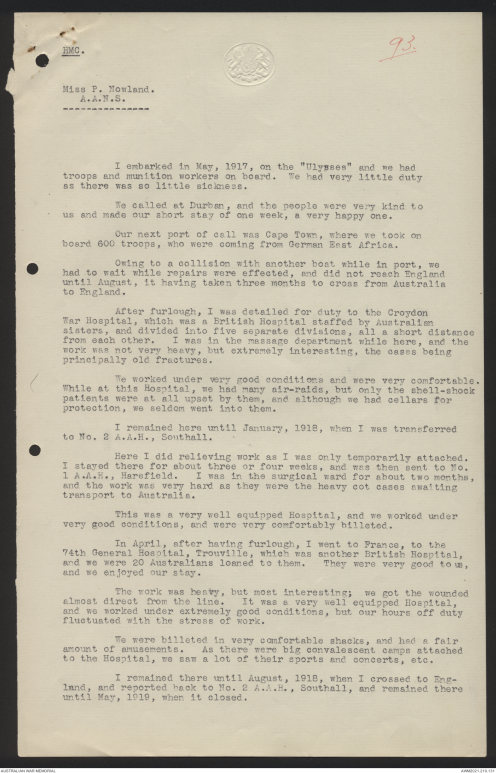
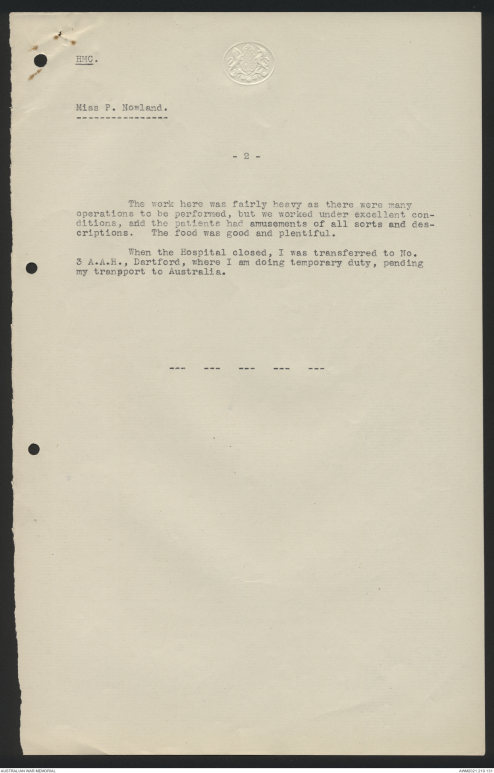
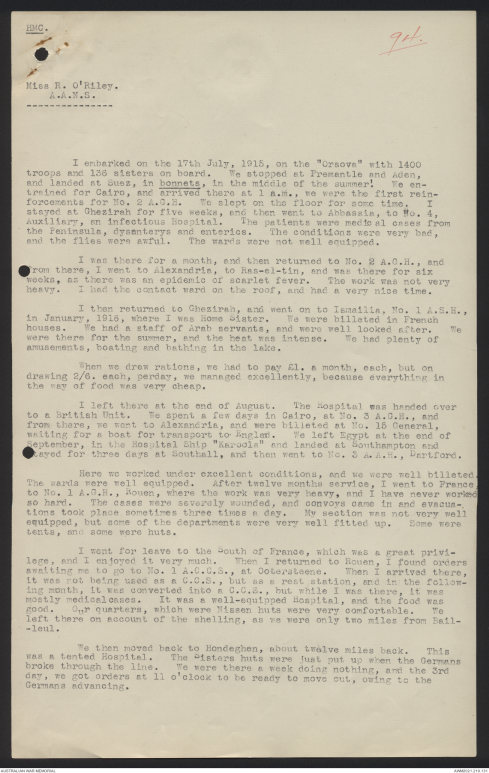
HMC.
87
Miss M. McCrimmon.
A.A.N.S.
I embarked on the 10th May, 1917, on the "Ulysses" and only
did a fortnight's duty.
Our first port of call was Durban, and we stayed there for
about a week, during which time we had shore leave every day , and the
people were extremely kind to us.
The next port was Cape Town where we took on some British
troops from German East Africa, who were being invalided to England.
On the voyage we sighted two submarines, but neither attacked us, and
we reached Devonport safely.
After fourteen days furlough, I went to the Croydon War Hospital,
which was a British hospital staffed by Australian Sisters, and
divided into sections. I was in the convalescent department, and the
work here was very easy indeed.
The food was fairly good and the amusements were not bad.
I remained here until January, when the Hospital was handed over
to a British Nursing Staff, and then went to No. 2 A.A.H., Southhall.
The work here was more interesting. This Hospital was the limbless centre
for Australian soldiers, and most of the cases were re-amputations.
The patients here had plenty of amusements in the way of theatres,
concerts, etc., in fact I might say they had practically everything they
wanted. We were most comfortably billeted.
I stayed there for a fortnight, and then I went to No. 1 A.A.H.,
Harefield, where the work was most interesting. Here most of the cases
were heavy cot cases awaiting transport to Australia; sometimes we were
very busy indeed. I was very happy at Harefield, and we worked under
extremely good conditions.
I remained until April, when I was transferred to France, and
on reaching Le Havre, I received orders to join the 74th British Hospital,
which was at Trouville.
This was a large very well equipped Hospital, and we worked under
fairly good conditions. We were extremely well received there, and everybody was good to us. The work was not heavy at first, but late it became
very much heavier, as we got the cases straight from the line.
I stayed here for six months, and then crossed again to England,
and went to Fovant. This was a large British Hospital, and we had very
heavy work, owing to the influenza epidemic. We lost many patients and
our time off duty varied with the stress of work.
I was there for about six weeks, and then went to No. 2 Command
Depot, Weymouth. This was also a camp Hospital, and the work was very
heavy at times, especially during the influenza epidemic, but it slackened
off later. I stayed there for about six months, and during that time was
extremely happy.
I then went to No. 3 A.A.H., Dartford, where I am now awaiting
transport to Australia.
HMC. 88.
Miss F. L. MacKay.
A.A.N.S.
I embarked in June, 1917, on the "Somali", and did no
duty, and had no sports with the other sisters, owing to attacks
of seasickness.
We reached Colombo after three weeks, and stayed there for
six days, and were entertained by the leading people there.
We went to Kandy for two days, and while there, visited the
King of Kandy's palace.
I embarked again on the "Dimera" and landed at Bombay, on
the 30th July. Here I went to the Victoria War Hospital, which was
a British Hospital staffed by Australians. The principal Matron,
A.A.M.S, had her Headquarters here.
The Hospital was fairly well equipped, and we worked under
fairly good conditions, but we felt the heat very much, as it was during
the monsoon season. We had both medical and surgical cases here,
from Mesopotamia, and some of them were very ill indeed. We had some
Turks for some time, and I was looking after them. They were frightfully
emaciated.
The food was plentiful, and the amusements were not bad, as
we had concerts, theatres, drives, etc. We were fairly comfortably
billeted.
The Hospital was a building three storeys high, capable of
holding two hundred patients in each ward. Each ward was divided into
sections of 100 beds.
I stayed there for six months, and was then transferred to
Bangalore. This is a huge military station in the South of India, and
we had at that time about 22,000 troops stationed there, so that we took
in mostly local sick from the surrounding camps.
The Hospital was very badly equipped, and we were billeted in
tents, which we found very cold, and during the monsoon season, we were
almost washed away. Later, however, they built huts, and when we were
billeted in them, we were very much more comfortable.
There were not many amusements, but the people were very good
to us, and we were made Hon. members of all the clubs. We had tennis,
driving, and picnic parties, and every second half day off duty.
The work here was very hard, because the Hospital was so large
and scattered, some of the sections being as much as ten minutes walk
from the mess, and the staff was very small, consisting of nine sisters,
and 2 V.A.D.s to about 1,000 patients.
The cases were nearly all cot cases, both medical and surgical.
We also had an infectious block, where we had small-pox, cholera and influenza.
The orderlies, although not trained - we trained ourselves -
were very good.
HMC.
Miss F. L. MacKay.
- 2 -
There were only two sisters on night duty for the whole
of the Hospital, and only a limited number of orderlies.
After twelve months, I left and reported at Bombay, from
which place we entrained for Ceylon, where we embarked on the "Wiltshire"
for Suez. We dis-embarked here, and went to Cairo, and
while waiting for a boat, went on duty.
We were billeted at the 45th Indian General, which was most
comfortable, and spent our times off duty, seeing the sights of
Egypt.
We left Port Said in January, on the "Kaiser I Hind" for
Marseilles, came across France in an ambulance train, and reached
Cherbourt, where we crossed on a packet steamer to Southampton.
After a fortnights' furlough, I joined No. 3 A.A.H., Dartford,
where I am now on duty, while awaiting transport to Australia.
HMC. 89
Miss S. M. McLennan.
A.A.N.S.
I embarked on the 30th August, 1917, on the "Wiltshire", and
arrived at Suez on October, 14th. I then entrained for Cairo, and
here I was loaned with six other Australians, to the 21st General
Hospital.
We got on very well indeed with the English, who were extremely
kind to us. I did surgical work all the time, most of the cases being
severely wounded from the Gaza Stunt.
The Hospital had been an old Military Barracks, and was beautifully
equipped, and the organisation was perfect. Our hours off duty
varied according to the work, but when possible, we had three hours a
day, and one day a month off duty. There were very few amusements for
the patients as they were mostly too ill, and when convalescent, they were
gradually discharged to other Hospitals.
We remained there for eight months, and then received orders
to join our Australian Unit, bound for Salonica. We reached Salonica
on the 22nd June, not having sighted any submarines.
I was detailed for duty at the 60th General Hospital, which
was at Hortisch, up in the hills, and was a large General Hospital. The
conditions were poor in comparison with the conditions of Egypt, but of
course, these Hospitals had been organised for a much longer period.
I did surgical work, and it was not very heavy.
I remained here for about three months, and was then transferred
to the 42nd British General, which was a dysentery Hospital at Uchanta.
This Hospital was very badly situated on the edge of a ravine,
which was infected with mosquitos, and many of the sisters contracted
malaria here. This was the hardest work I have ever done on active
service.
In the afternoons, I had three wards to look after, 40 beds in
each ward, all acutely ill, my only help being an orderly. I felt the
cold there very much in the winter, as there was only one primus stove
for the three wards.
Here I contracted malaria of a severe type, and was off duty for
seven weeks, and after convalescence, I was transferred to the 52nd Gen.
which was a much better equipped hutted Hospital. As it was on the eve
of closing, I did very little duty, being temporarily attached to the
operating room.
On the third of March, I crossed to England, and after three
weeks furlough, I was detailed for duty to No. 3 A.A.H., Dartford, where
I am at present awaiting transport to Australia.
LC.
90
Miss E.S. Mc Murtrie,
A.A.N.S.
I embarked on the 31st August, 1917, on the "Wiltshire",
and reached Suez the first week in October, where I entrained
for Alexandria.
I was detailed for duty at the 21st General Hospital. Work
was very heavy indeed after the Gaze stunt. It was a very well
equipped hospital and well run. I was one of ten Australian
sisters loaned to this British Hospital, and they were extremely
kind to us and gave us every consideration. I remained here
eight months, the work varying, sometimes we were very slack.
We had a day a month, half a day a week, and three hours a day
off duty. I left Alexandria on the 14th June, 1918, for Salonica.
On arrival I was detailed for duty at the 60th General
Hospital which was situated about 17 kilos from the town, up in
the hills. We worked under very fair conditions, but the heat
was very trying. Most of the patients were malaria cases and
responded very well to the treatment. There were very few
amusements for the patients. We had to be in camp by sundown.
I remained here until October when the whole camp moved to
Lembert.
I only stayed with the 60th unit for about a week when I was
detailed for duty at the 42nd General Hospital. This was a
malaria and dysentry hospital, and it was very badly situated
on the edge of a ravine. It was here that a great many of our
sisters contracted malaria and were invalided to Australia.
The conditions were only fair. While here we had some very
heavy storms, the rain in Salonica being very severe and the winds
most trying. It was with great difficulty the tents were kept
standing. The R.A.M.C. personnel and the Australian Nursing
Service worked very well together in the Hospital
I stayed at the 42nd until February 1919, when it was closed,
and I was then transferred to the 52nd General which was a special
malaria Hospital. I was only here for a few weeks when I left
for furlough in England.
After three weeks' leave I joined the 3rd A.A.H., Dartford,
where I am on relieving duty awaiting transport to Australia.
The work here is very light indeed as most of the patients are
just awaiting transport to Australia also.
HMC.
91
Miss A. Norton.
A.A.N.S.
I embarked in November, 1915, on the "Orsova". We had 1700
troops on board, but there was very little sickness, and so we did practically
no duty. Arriving at Vairo, we were detailed for duty at No. 1
A.G.H., Heliopolis, and were very busy there. The wounds were very
severe, and we had a lot of frostbites. The conditions were very good,
and we were extremely comfortably. We had every second afternoon off
duty, and a day a week.
From there, I went to Luna Park to No. 1 A.A.H., which was very
well equipped. I worked in the T.B. ward at the time, and the patients
there were very bad. We had no deaths, however. It was very hot, and
we felt the heat extremely. We were comfortably billeted at No. 3
A.G.H., and went daily to Luna Park. I was later transferred to No. 3
A.G.H., The Sporting Club. It was rather crude there, but we were fairly
comfortable. The patients were mostly convalescent.
From there, I went to the infectious Hospital at Choubra, and
worked amongst the scarlet fever and dysentery. It was a most comfortable
Hospital. We had many deaths from dysentery.
I then crossed to England, and came straight to France, to No. 7,
Stationary, Boulogne. We had only wounded Officers there. It was a very
large building, and we worked under very good conditions, and were billeted
at various hotels. We had no fires there as there was no coal, and so we
felt the cold more or less. There was also a shortage of food, and the
restrictions were very stringent. While at this Hospital, we had to go
down to the Hospital boats, and do the dressings, for a few weeks.
From there, I was transferred to No. 25, General, Hardelot, which
was a large skin Hospital. I was in the surgical ward, and was extremely comfortably billeted. From there, I went to the 49th C.C.S., where we were
raided every night, but had no casualties in the Hospital, though there were
plenty wounded round about. We used to get patients straight from the line
nearly every day, and the wounds were very severe. The gas cases were the
worst. Patients often died from small wounds, because gas gangrene set in.
We never kept the patients long, unless they were severe ones, and were practically
hopeless. The food was very good.
From there, I went back to No. 25, General and nursed gas cases.
Many of the patients got influenza following the gas. I then went to No. 3
A.G.H., Abbeville, and there we had many wounded. After that, we had
influenza, and broncho pneumonia, and from the two we lost many patients.
I stayed there until it closed and after furlough, I went to No.
3 A.G.H., Dartford, where I am now awaiting transport to Australia.
HMC.
92
Miss E. A. Norton.
A.A.N.S.
I embarked on the 8th November, 1915, on the "Orsova" and
arrived at Suez, and came to No. 1 A.G.H., Heliopolis, where I stayed
until it closed down. I did surgical work, but later went to the
eye and ear ward. Many of the patients got eye trouble from the sand
of the desert. We worked under very good conditions. We were very comfortably
billeted, and the mess was fairly good later. When No. 1 A.G.H.
closed, I went to No. 3 A.A.H., the Sporting Club, where the patients were
mostly convalescent, awaiting return to Australia. The conditions were
much rougher here. I stayed here until the Sporting Club closed, and then
was transferred to the infectious Hospital at Choubra. I was with the
dysentery cases from Msopotamia. These patients were in a very bad
condition, and died very quickly. They were frightfully emaciated,
and did not respond well to the treatment. The Hospital was well
equipped, and we were very comfortable there. In January, I came over
to England and ten days later, went to France. I went to No. 7 Stationary
Hospital at Boulogne, which was an Officers Hospital. The work was
very heavy there, and I saw for the first time the Carrell Dakin
method in use.We had all surgical work, in the form of heavy battle
casualties.
I was loaned to the 12th General for three weeks, as
they were frightfully busy during Viny Ridge push. It was a
British Matron and Staff, and they gave us a warm welcome. After
that I transferred to No. 25 General, another British Hospital with
an Australian Nursing Staff. The quarters were very comfortable, but
it was not interesting work, being chiefly skins, but the treatment
produced very good results. It was excellently equipped as a skin
Hospital, but the food was not very good, at least not for skin patients.
From there, I went to the 49th C.C.S., for six weeks,
where the work was very interesting. We had cases straight from
the line there, some severe wounds, and some gas. We had a lot of
deaths. It was very depressing to see to many dying without responding
to treatment. It was a British C.C.S., and we were most
kindly received, and comfortably billeted.
In January, we returned to No. 25, where I remained
until October, when I went to No. 3 A.G.H., Abbeville, where the
work was very heavy, but it slackened down until the influenza
epidemic in November, and then the work was terrible. We lost
many patients, I stayed there until it closed, and then crossed
to England, and after furlough went to No. 3 A.G.H., Dartford, where
I am now awaiting transport to Australia.
HMC.
93.
Miss P. Nowland.
A.A.N.S.
I embarked in May, 1917, on the "Ulysses" and we had
troops and munition workers on board. We had very little duty
as there was so little sickness.
We called at Durban, and the people were very kind to
us and made our short stay of one week, a very happy one.
Our next port of call was Cape Town, where we took on
board 600 troops, who were coming German East Africa.
Owing to a collection with another boat while in port, we
had to wait while repairs were effected, and did not reach England
until August, it having taken three months to cross from Australia
to England.
After furlough, I was detailed for duty to the Croydon
War Hospital, which was a British Hospital staffed by Australian
sisters, and divided into five separate divisions, all a short distance
from each other. I was in the massage department while here, and the
work was not very heavy, but extremely interesting, the cases being
principally old fractures.
We worked under very good conditions and were very comfortable.
While at this Hospital, we had many air-raids, but only the shell-shock
patients were at all upset by them, and although we had cellars for
protection, we seldom went into them.
I remained here until January, 1918, when I was transferred to
No. 2 A.A.H., Southall.
Here I did relieving work as I was only temporarily attached.
I stayed there for about three or four weeks, and was sent to No.
1 A.A.H., Harefield. I was in surgical ward for about two months,
and the work was very hard as they were the heavy cot cases awaiting
transport to Australia.
This was a very well equipped Hospital, and we worked under
very good conditions, and were very comfortably billeted.
In April, after having furlough, I went to France, to the
74th General Hospital, Trouville, which was another British Hospital,
and we were 20 Australians loaned to them. They were very good to us,
and we enjoyed our stay.
The work was heavy, but most interesting; we got the wounded
almost direct from the line. It was a very well equipped Hospital,
and we worked under extremely good conditions, but our hours off duty
fluctuated with the stress of work.
We were billeted in very comfortable shacks, and had a fair
amount of amusements. As there were big convalescent camps attached
to the Hospital, we saw a lot of their sports and concerts, etc.
I remained there until August, 1918, when I crossed to England,
and reported back to No. 2 A.A.H., Southall, and remained there
until May, 1919, when it closed.
HMC.
Miss P. Nowland.
-2-
The work was fairly heavy as there were many
operations to be performed, but we worked under excellent conditions,
and the patients had amusements of all sorts and descriptions.
The food was good and plentiful.
When the Hospital closed, I was transferred to No.
3 A.A.H., Dartford, where I am doing temporary duty, pending
my transport to Australia.
HMC.
94.
Miss R. O'Riley.
A.A.N.S.
I embarked on the 17th July, 1915, on the "Orsova" with 1400
troops and 136 sisters on board. We stopped at Fremantle and Aden,
and landed at Suez, in bonnets, in the middle of summer! We entrained
for Cairo, and arrived there at 1 a.m., we were the first reinforcements
for No. 2 A.G.H. We slept on the floor for some time. I
stayed at Ghezirah for the five weeks, and then went to Abbassia, to No. 4,
Auxiliary, an infectious Hospital. The patients were medical cases from
the Peninsula, dysenterys and enterics. The conditions were very bad,
and the flies were awful. The wards were not well equipped.
I was there for a month, and then returned to No. 2 A.G.H., and
from there, I went to Alexandria, to Ras-el-tin, and was there for six
weeks, as there was an epidemic of scarlet fever. The work was not very
heavy. I had the contact ward on the roof, and had a very nice time.
I then returned to Ghezirah, and went on to Ismailia, No. 1 A.S.H.,
in January, 1916, where I was Home Sister. We were billeted in French
houses. We had a staff of Arab servants, and were very well looked after. We
were there for the summer, and the heat was intense. We had plenty of
amusements, boating and bathing in the lake.
When we drew rations, we had to pay £1. a month, each, but on
drawing 2/6. each , perday, we managed excellently, because everything in
the way of food was very cheap.
I left there at the end of August. The Hospital was handed over
to a British Unit. We spent a few days in Cairo, at No. 3 A.G.H., and
from there, we went to Alexandria, and were billeted at No. 15 General,
waiting for a boat for transport to England. We left Egypt at the end of
September, in the Hospital Ship "Karoola" and landed at Southampton and
stayed for three days at Southall, and then went to No. 3 A.A.H., Dartford.
Here we worked under excellent conditions, and we were well billeted.
The wards were well equipped. After twelve months service, I went to France,
to No. 1 A.G.H., Rouen, where the work was very heavy, and I have never worked
so hard. The cases were severely wounded, and convoys came in and evacuations
took place sometimes three times a day. My section was not very well
equipped, but some of the departments were very well fitted up. Some were
tents, and some were huts.
I went for leave to the South of France, which was a great privilege,
and I enjoyed it very much. When I returned to Rouen, I found orders
awaiting me to go to No. 1 A.C.C.S., at Ootersteene. When I arrived there,
it was not being used as a C.C.S., but as a rest station, and in the following
month, it was converted into a C.C.S., but while I was there, it was
mostly medical cases. It was a well-equipped Hospital, and the food was
good. Our quarters, which were Nissen huts were very comfortable. We
left there on account of the shelling, as we were only two miles from Bailleul.
We then moved back to Hondeghen, about twelve miles back. This
was a tented Hospital. The sisters huts were just put up when the Germans
broke through the line. We were there a week doing nothing, and the 3rd
day, we got orders at 11 o'clock to be ready to move out, owing to the
Germans advancing.
 Sam scott
Sam scottThis transcription item is now locked to you for editing. To release the lock either Save your changes or Cancel.
This lock will be automatically released after 60 minutes of inactivity.